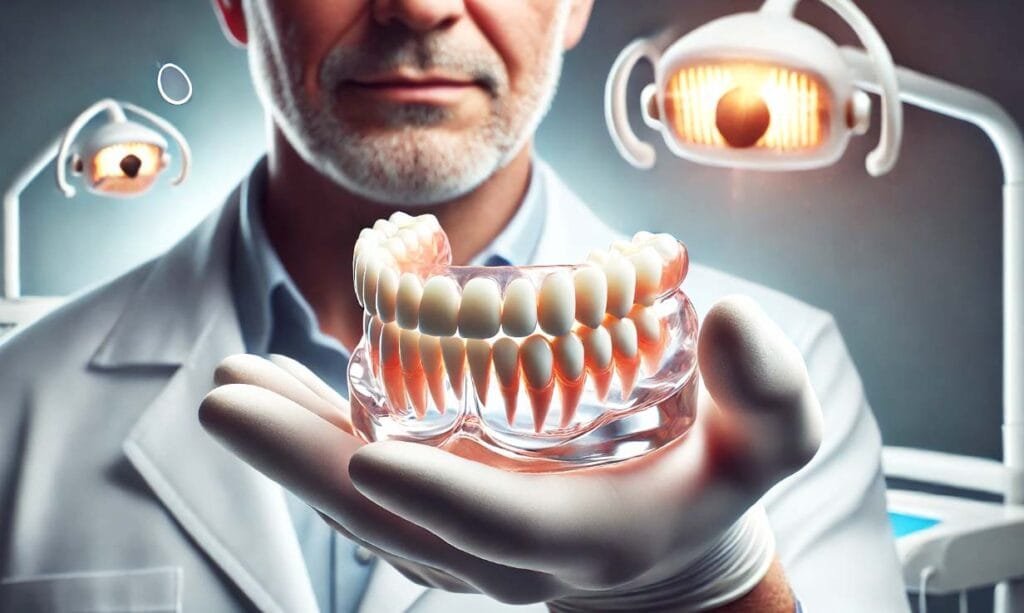Bone loss in your jaws from wearing complete dentures. This occurs because your teeth are missing. Its absence weakens your jawbone, requiring teeth to build strong bones. Without teeth, the jawbone begins to lose width and height. This makes it more difficult for your dentures to fit correctly. Here are a few tips to consider if you have complete dentures and want to help manage bone loss with complete dentures:
- See your dentist regularly. They can access the way your dentures fit and bone levels. This aids in the early detection of bone loss.
- Have dentures relined or rebased. When your bone shapes change, so do your dentures—they must be adjusted to fit accordingly. This helps in preventing the loss of more bone.
- Look into implant-supported dentures. One of the benefits of dental implants is that they keep your jawbone healthy. The implants offer support, allowing your dentures to fit better.
- Eat a healthy diet. Calcium and vitamin D-rich foods help bone health. Stay away from sugar or acidic foods, which may erode bones.
- Do jaw exercises. Jaw movements and chewing promote bone stimulation. This can slow down bone loss with complete dentures. These tips will help you deal with bone loss and keep your dentures fitting right. The best way to be prepared for this challenge is to stay closely in touch with your dentist regarding your subtractive work.
Loss of bone can change how ill-fitting your dentures are and feel. This is especially important if you have complete dentures. Learning how to cope with and respond to bone loss is critical to oral health and quality of life. This article provides tips on how to manage bone loss with complete dentures. It offers actionable advice you can apply.

Bone Loss with Complete Dentures: A Comprehensive Guide
Bone loss is typical for denture wearers, particularly in the jaw. Commonly occurs after teeth are lost. Bone loss can alter the face’s shape, the jaw’s position, and how well dentures fit. One option is understanding how bone loss with complete dentures affects your dentures.
What Causes Bone Loss?
Over time, bone loss occurs when the jawbone deteriorates. This happens in the absence of natural tooth roots. When teeth are lost, the bone that held them begins to resolve. Things that lead to bone loss with complete dentures include:
Missing a tooth results in loss of the bone. As we age, we naturally lose bone density. Ill-fitting dentures also can lead to bone loss with complete dentures. This is because they exert uneven pressure in the mouth onto the gums and jaws. Diseases such as osteoporosis, diabetes, and gum disease can also lead to bone loss with complete dentures.
How It Affects Full Dentures

Bone loss alters jaw shape. This has implications for the fit of dentures. As the jawbone shrinks, dentures can move or feel uncomfortable. This causes issues such as:
Ill-fitting dentures can slide out of place during eating or talking. This can lead to sores and irritation of the gums from friction. Bone loss can also create difficulties when chewing some foods. The jawbone loses density over time, which may cause the face to look sunken—changing your overall appearance.
How to Add Kefir to Your Keto Diet 👉 Learn More
Bone Loss with Complete Dentures Management Tips
Tips for preventing bone loss with complete dentures. They can help you maintain healthy teeth, stabilize your dentures, and improve your quality of life.
1. Denture Checkups and Adjustments
It’s essential to see your dentist or prosthodontist regularly. This tracks changes in your bones. It also allows dentures to fit well. Dentures may need adjusting over time by your dentist. That is because your jaw shape can shift.

A dentist can help with a reline or rebase to ensure your dentures fit securely. That can bring their fit back and help with comfort. Your dentist will look for signs of bone loss or gum irritation. That can enable early treatment when necessary.
2. Bone Grafting and Implants
In cases of significant bone loss with complete dentures, implants and grafting are a healthy choice for the patient. These steps rebuild and regenerate lost bone. This makes your dentures more stable and supported.
Bone grafting removes bone from elsewhere in your body or from a synthetic source. We put it in your jaw to help grow new bone. Dental implants are implanted in your jawbone. They maintain denture stability, support dentures, and reduce bone resorption.
3. How to Choose the Correct Type of Denture
There are various types of dentures. With the right dentures, bone loss can be managed. Dentures don’t all function in the same manner. The Perfect Denture The Type Of Denture You Need It can make a massive difference in bone loss with complete denture management.
They are known as implant-supported dentures, which attach to dental implants. That gives them more stability. It also relieves stress on the jawbone. Flexible dentures are usually made of flexible materials. This enables them to make better adjustments to the jaw structure. This might make them easier to wear. Overdentures sit on top of your natural teeth or implants. This provides extra support. In addition, it stops the continued loss of bone in your jaw.
4. Maintenance And Care of Dentures
It is essential to take care of your dentures. This allows them to form better and last longer. Losing bone can lead to other oral health problems, but simple habits can help prevent it.
Practice daily denture cleaning. Use a soft brush and mild soap. Do not use harsh chemicals that could harm the denture material. Soak dentures overnight in a cleaner. This keeps them in shape and hygienic. If you cannot remove your dentures immediately, rinse your mouth after eating. This helps limit the accumulation of food debris.

5. Nutrition and Bone Health
A well-balanced diet is crucial for healthy bones. Chugging your daily glass of milk by mouth is not the end of good bone well-being; good nutrition can help renew your bones and slow bone loss with complete dentures. Eating the right foods promotes healthy bones. This is important as we age to help prevent problems like osteoporosis. Eating a balanced diet with plenty of nutrients is essential for maintaining healthy bones over the long term.
Calcium, in addition to vitamin D, is essential for strong bones. Consume calcium-containing foods such as dairy products, grains, and fortified cereals. Magnesium aids your body by using calcium. The best sources of magnesium are nuts, seeds, and whole grains. Avoid too much sugar. It can lead to gum disease and bone loss with complete dentures.
6. Practice Jaw Exercises
Jaw exercises can increase blood circulation in the jawbone. This encourages healthy bone remodelling. These exercises might help build the muscles in the jaw. They can also enhance denture retention.
Gently chewing gum or softer foods helps blood flow to your jaw. This activates bone activity. To stretch the jaw, begin by opening and closing your mouth slowly. This prevents stiffness.
What You Can Do Now to Prevent Bone Loss

Here is the content in improved human language: Bone loss can occur gradually over time. But there are steps you can take to prevent it from getting worse. This will allow you to maintain a healthy smile.
Smoking cessation, in particular, is critical. Smoking leads to bone loss and reduces healing. Stopping smoking can help save your jawbone. Practice good oral hygiene is essential. Brush gums, tongue, and remaining natural teeth, even with dentures. This aids in the upkeep of your oral health. Regular physical activity can make a difference. Exercise can boost circulation. Improved circulation may support your bones and oral health.
FAQ: Managing Bone Loss with Complete Dentures
How can I prevent my dentures from sliding around because of bone loss?
Will dentures s
What is the ideal lifespan for my dentures?
Am I able
Conclusion
Treating your dentures properly also helps prevent bone loss. Professional care, maintenance, lifestyle changes, and suitable dental solutions are best to keep it in check. The Mac magazine excels in providing tips and tricks, and here are a few that can help limit bone loss with complete dentures. It can also keep your prosthetics stable and comfortable. This will help the rest of your oral health, too. You can adjust your dentures, get implants, and change your diet. Taking steps now can keep your smile healthy for years to come.




